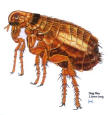Fleas
Fleas are a type of wingless parasite found worldwide. They feed off the blood of humans and animals such as dogs and cats. Since fleas use a wide range of hosts, diseases can be transferred from one host to another.
They pierce the skin, inject an anti-coagulant chemical into the host to prevent blood clotting and suck out the blood some passing straight through their rectum in order to lay their eggs.
Symptoms of a flea bite
The bite of a flea has certain features:
- It is extremely itchy
- A red, swollen wheal develops anywhere up to half an hour after the bite
- After a day or so, the wheal (lump) may develop into a blister or small wound
- The legs and feet are often targeted
- Secondary infections caused by scratching are common
- Some people may be very sensitive to bites
Blood feeding
Adult fleas can survive for some months without feeding. The flea uses its saw-like mandibles (jaws) to cut through skin, usually on accessible parts of the body such as the legs or feet. Flea saliva contains anticoagulants to encourage the blood to keep flowing. Female fleas are prompted to lay their eggs after feeding. The eggs are light coloured and oval-shaped. The larvae cocoon themselves within weeks of hatching. Vibration, such as footsteps, prompts adult fleas to emerge from their cocoons. This is why you may be bitten after entering a house that has been unoccupied for some time.
Controlling fleas
It is absolutely essential for carpets to be thoroughly vacuumed especially in low traffic areas, under furniture, etc, and throw away the bag, since it will contain fleas and eggs, use a surface spray into the vacuum cleaner bag.
- Clean animal bedding and the general surrounds thoroughly
- Wash outdoor areas which is used by your pet, such as kennels, with appropriate insecticides
- Maintain hygiene practices (regular vacuuming, keeping pets free of fleas etc) to prevent another infestation
- Restrict access of your dog and/or cat, to internal and subfloor areas particularly during the summer months
- A persistent infestation may need to be treated by a qualified pest technician who can determine the type, source and extent of the infestation, then use registered insecticides to control the fleas.
